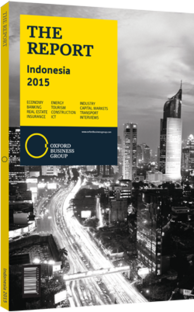Budi G Sadikin, President-Director, Bank Mandiri: Interview

Interview: Budi G Sadikin
Can Indonesia’s banks boost micro, small and medium enterprise (MSME) lending while preventing non-performing loan (NPL) levels from growing?
BUDI G SADIKIN: The MSME segment plays a significant role, as it encapsulates 99% of all businesses in Indonesia and often serves as the propeller of the economy. In addition, the government is trying to boost credit to MSMEs so that they will have a higher contribution to national growth. In our view, the risk of the MSME sector is relatively high because part of this segment has limited or no collateral. Recent data indicates that the NPL rate of this business has increased since the economy began to slow down, commodity prices declined and Bank Indonesia started to tighten monetary policy. There is a possibility of higher NPL rates in the near term because of the weaker economy, so banks have to know their debtors well in the MSME segment. One factor causing the high NPL rate is higher interest rates, so banks should also stabilise interest rates on MSME lending. One solution to high-risk MSME loans is the establishment of credit insurance, with the risk shared by banks and credit insurance companies. Banks should also conduct more training to MSME loan officers so that they are better prepared to manage risks.
How do you envisage the use and implementation of IT solutions to improve banking practices?
SADIKIN: IT is vital in the development of the banking and financial sector in increasing penetration, productivity and efficiency. IT has enabled us to introduce innovative products to our customers. Technology can also be harnessed to automate branches, ensure the timely flow of information and help the decision-making process. Banks that can absorb new technology faster will have a competitive edge over rivals. Advanced IT systems are also needed to support the implementation of branchless banking and improve access to financial services. IT can lead to greater population penetration, and it provides the ability to serve remote locations at low cost. In Indonesia, getting the poor to bank has been difficult, so technology will be key to bringing banking services to the masses.
How will ASEAN integration impact Indonesia’s banking sector and financial framework?
SADIKIN: The level of development in ASEAN banking varies widely. The penetration level of Indonesia’s banking industry to the economy is still low compared to its regional peers. Indonesia’s loan to GDP ratio in 2014 was 36.1%, below Singapore (158.8%), Malaysia (120.95%), Thailand (104.3%) and still even lower than the Philippines (38.2%). The deposit to GDP ratio in Indonesia is also still behind other ASEAN countries. Its deposit to GDP ratio in 2014 was 38.9%, lower than Malaysia (153.4%), Singapore (141.1%), Thailand (95.8%) and the Philippines (51.7%). We believe that the growth prospects of the Indonesian banking industry are better than other ASEAN-5 countries.
The average loan growth of Indonesian banks in 2009-14 was 20.7% per year, higher than in Singapore (16.9%) and almost twice that of Malaysia (11.7%), the Philippines (12.2%) and Thailand (10.6%). Higher credit growth makes Indonesia’s banks’ profitability higher than for other ASEAN-5 banks. Return on assets of Indonesian banks in 2014 was 3%, higher than that of the Philippines (1.2%), Malaysia (1.2%), Thailand (1.1%) and Singapore (1.1%). The higher loan growth and profitability make Indonesia very attractive to foreign banks.
Bank Indonesia has agreed to join the ASEAN Banking Integration Framework as part of the wider implementation of the ASEAN Economic Community. We hope that the agreement will enhance reciprocity among the ASEAN countries, so that Indonesian banks can also operate in other countries that have been imposing restrictions on our expansion. Moreover, our current financial framework is focused on financial stability. Integration of the financial sector should not trigger any risk of financial crisis contagion in ASEAN. Therefore our financial authorities should be given more access to foreign banks operating in Indonesia.
You have reached the limit of premium articles you can view for free.
Choose from the options below to purchase print or digital editions of our Reports. You can also purchase a website subscription giving you unlimited access to all of our Reports online for 12 months.
If you have already purchased this Report or have a website subscription, please login to continue.

